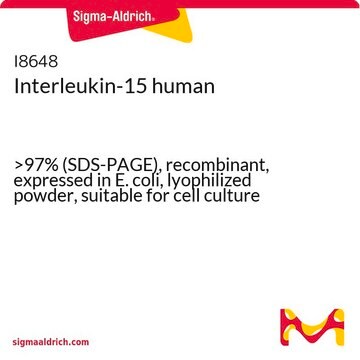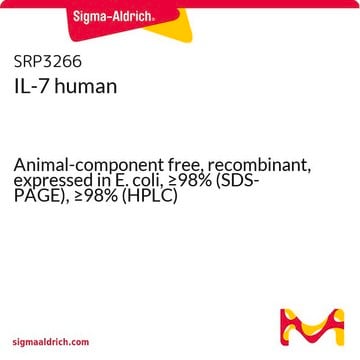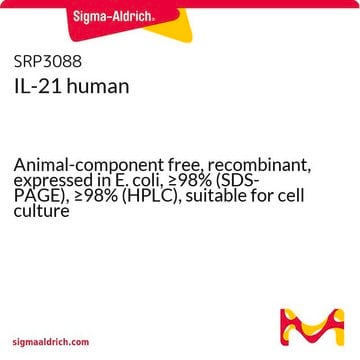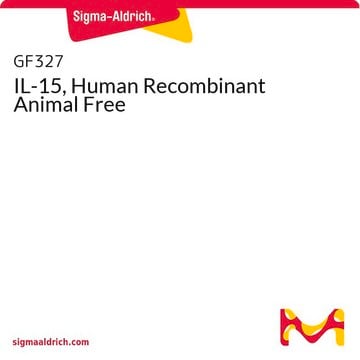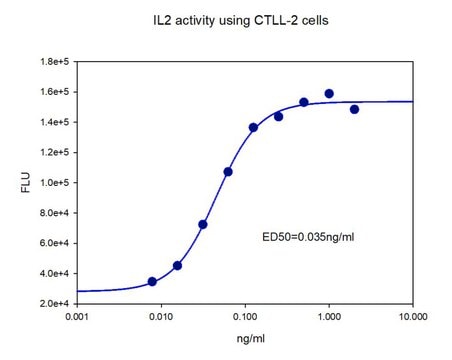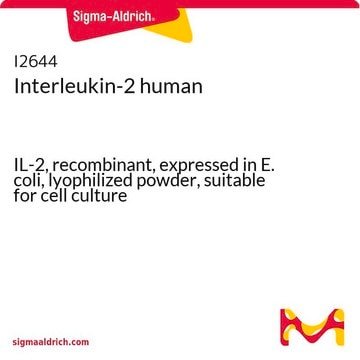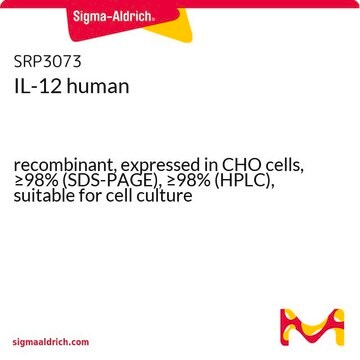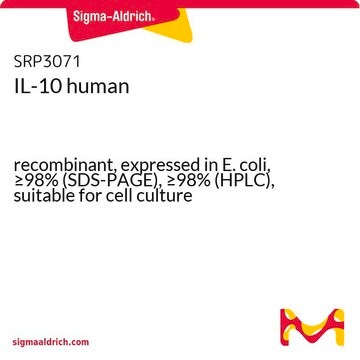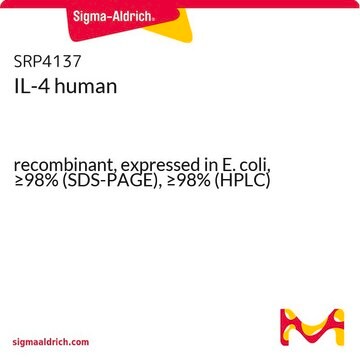SRP3077
IL-15 human
Animal-component free, recombinant, expressed in E. coli, ≥98% (SDS-PAGE), ≥98% (HPLC), suitable for cell culture
Synonym(s):
IL-T
Sign Into View Organizational & Contract Pricing
All Photos(1)
About This Item
UNSPSC Code:
12352202
NACRES:
NA.32
Recommended Products
biological source
human
recombinant
expressed in E. coli
Assay
≥98% (HPLC)
≥98% (SDS-PAGE)
form
lyophilized
potency
≤0.5 ng/mL ED50
mol wt
12.9 kDa
packaging
pkg of 10 μg
technique(s)
cell culture | mammalian: suitable
impurities
<0.1 EU/μg endotoxin, tested
color
white to off-white
UniProt accession no.
shipped in
wet ice
storage temp.
−20°C
Gene Information
human ... IL15(3600)
General description
Interleukin-15 (IL-15) is an immunomodulating cytokine. The gene encoding it is localized on chromosome 4q31. Human IL-15 is biologically active on mouse cells as measured by the dose-dependent stimulation of the proliferation of mouse CTLL cells. Recombinant human IL-15 is a 12.9kDa protein consisting of 115 amino acid residues.
Biochem/physiol Actions
Interleukin-15 (IL-15) stimulates the proliferation of T lymphocytes and shares many biological properties with IL-2. It exerts its biological activities primarily on T cells. It is also essential in the development, survival and activation of NK cells. On binding to its receptor, IL-15 is indirectly involved in activating proto-oncogenes. Increased expression of IL-15 has been implicated with rheumatoid arthritis, inflammatory bowel disease, multiple sclerosis and diseases affiliated with retroviruses like human immunodeficiency virus (HIV) and human T-lymphotropic virus-1 (HTLV-I).
Sequence
MNWVNVISDL KKIEDLIQSM HIDATLYTES DVHPSCKVTA MKCFLLELQV ISLESGDASI HDTVENLIIL ANNSLSSNGN VTESGCKECE ELEEKNIKEF LQSFVHIVQM FINTS
Physical form
Lyophilized from 10 mM Sodium Phosphate, pH 8.5.
Reconstitution
Centrifuge the vial prior to opening. Reconstitute in water to a concentration of 0.1-1.0 mg/ml. Do not vortex. This solution can be stored at 2-8°C for up to 1 week. For extended storage, it is recommended to further dilute in a buffer containing a stabilizer (example 0.1% BSA) and store in working aliquots at -20°C to -80°C.
Storage Class Code
11 - Combustible Solids
WGK
WGK 3
Flash Point(F)
Not applicable
Flash Point(C)
Not applicable
Certificates of Analysis (COA)
Search for Certificates of Analysis (COA) by entering the products Lot/Batch Number. Lot and Batch Numbers can be found on a product’s label following the words ‘Lot’ or ‘Batch’.
Already Own This Product?
Find documentation for the products that you have recently purchased in the Document Library.
Customers Also Viewed
McKenzie, A.N.J., et al.
Cytokine Reference, 203-211 (2001)
Mario Bunse et al.
Molecular therapy : the journal of the American Society of Gene Therapy, 22(11), 1983-1991 (2014-07-23)
Genetically modified T cells that express a transduced T cell receptor (TCR) α/β heterodimer in addition to their endogenous TCR are used in clinical studies to treat cancer. These cells express two TCR-α and two TCR-β chains that do not
K H Grabstein et al.
Science (New York, N.Y.), 264(5161), 965-968 (1994-05-13)
A cytokine was identified that stimulated the proliferation of T lymphocytes, and a complementary DNA clone encoding this new T cell growth factor was isolated. The cytokine, designated interleukin-15 (IL-15), is produced by a wide variety of cells and tissues
Gerharda H Boerman et al.
Cancer immunology, immunotherapy : CII, 64(5), 573-583 (2015-04-10)
Children with advanced stages (relapsed/refractory and stage IV) of rhabdomyosarcoma (RMS) have a poor prognosis despite intensive chemotherapy and autologous stem cell rescue, with 5-year survival rates ranging from 5 to 35 %. Development of new, additional treatment modalities is
Yongjun Sui et al.
The Journal of clinical investigation, 124(6), 2538-2549 (2014-05-20)
Vaccines are largely evaluated for their ability to promote adaptive immunity, with little focus on the induction of negative immune regulators. Adjuvants facilitate and enhance vaccine-induced immune responses and have been explored for mediating protection against HIV. Using a regimen
Our team of scientists has experience in all areas of research including Life Science, Material Science, Chemical Synthesis, Chromatography, Analytical and many others.
Contact Technical Service